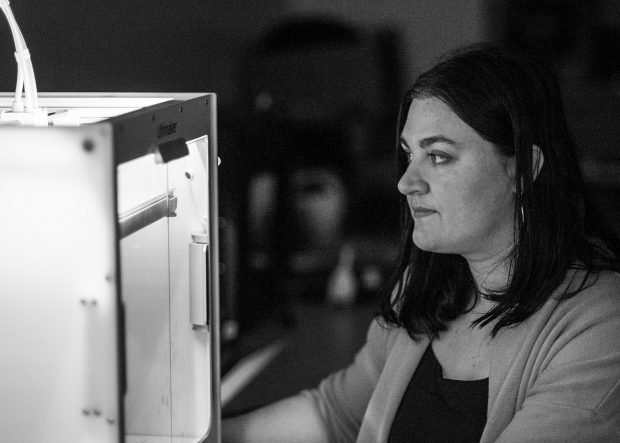[et_pb_section fb_built=”1″ admin_label=”section” _builder_version=”4.16″ custom_padding=”0px|||||” global_colors_info=”{}”][et_pb_row admin_label=”row” _builder_version=”4.16″ background_size=”initial” background_position=”top_left” background_repeat=”repeat” global_colors_info=”{}”][et_pb_column type=”4_4″ _builder_version=”4.16″ custom_padding=”|||” global_colors_info=”{}” custom_padding__hover=”|||”][et_pb_text admin_label=”Text” _builder_version=”4.27.2″ background_size=”initial” background_position=”top_left” background_repeat=”repeat” custom_padding=”0px|||||” hover_enabled=”0″ global_colors_info=”{}” sticky_enabled=”0″]
Telling Stories with Data: Digital Skills & Knowledge Mobilization
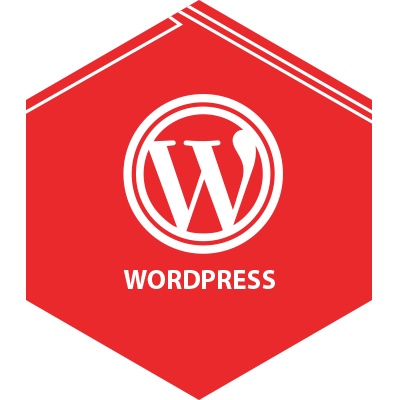 We had a busy 2022 in the Digital Scholarship Commons (DSC) as we continued to help students, faculty and staff learn to tell stories about their research in ways beyond text to further their public scholarship and knowledge mobilization efforts.
We had a busy 2022 in the Digital Scholarship Commons (DSC) as we continued to help students, faculty and staff learn to tell stories about their research in ways beyond text to further their public scholarship and knowledge mobilization efforts.
The number of digital fluency workshop participants was up 1% over 2021, and we taught a total of 5,905 individuals. Website Creation with WordPress was our most popular workshop by participants, followed by Excel, Video Editing, and Infographics. The DSC collaborated with professors in 20 disciplines to integrate DSC workshops into their curriculums. Professors in Education, Indigenous Education, Business, Health Informatics, and Anthropology were our most frequent collaborators.
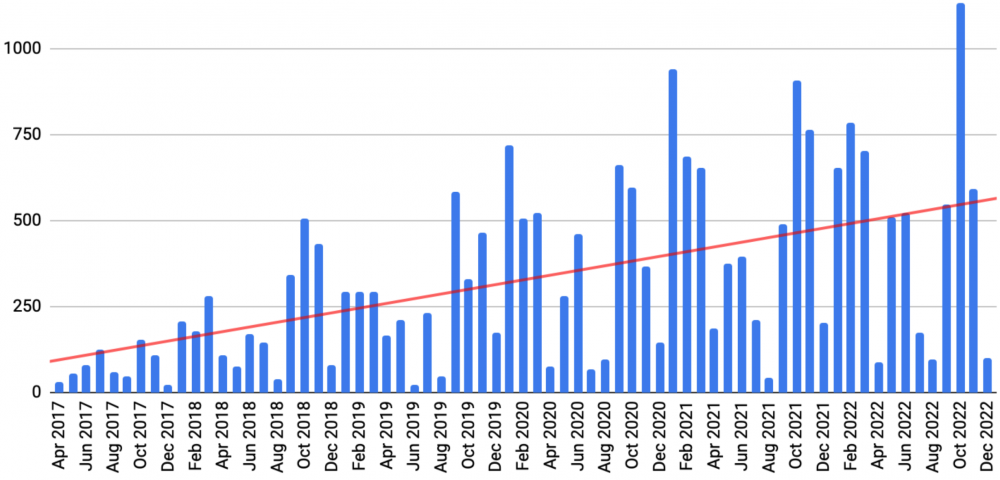
“The Digital Scholarship Commons is my favourite place in the library! DSC staff developed custom video editing workshops to help my students create their own short adaptations of the Chinese-language movies and literature that they have studied in class.” – Dr. Angie Chau, Pacific and Asian Studies
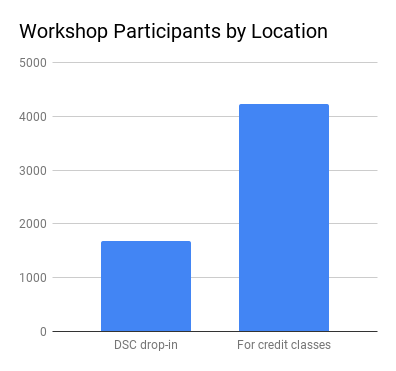 A significant majority of DSC drop-in workshop participants prefer Zoom workshops over face-to-face workshops after returning to campus after the COVID campus closure ended. This preference was first noticed in the fall of 2021 when in-person DSC workshops were offered in a “hyflex” format. DSC instructors learned that it was significantly more difficult to pay attention to the needs of face-to-face participants during active learning times when there were only one or two face-to-face participants and six or more Zoom participants. This was reinforced by unsolicited feedback from face-to-face workshop participants about the difficulties.
A significant majority of DSC drop-in workshop participants prefer Zoom workshops over face-to-face workshops after returning to campus after the COVID campus closure ended. This preference was first noticed in the fall of 2021 when in-person DSC workshops were offered in a “hyflex” format. DSC instructors learned that it was significantly more difficult to pay attention to the needs of face-to-face participants during active learning times when there were only one or two face-to-face participants and six or more Zoom participants. This was reinforced by unsolicited feedback from face-to-face workshop participants about the difficulties.
The DSC workshop instructors decided to schedule the majority of their drop-in workshops as Zoom-only starting in the fall of 2022. Workshops that required physical access to hardware or specialized equipment continue to be held face-to-face in the library.
Workshops held in for-credit classes at the invitation of professors are approximately 90% face-to-face in classrooms across campus, with the remaining 10% conducted over Zoom.
“I have never felt more welcome at a Zoom workshop than how I felt at this event. Their efforts to greet and chat with me really helped to reduce how intimidated I felt since I didn’t have any experience with the topic. I was also so impressed with how generous the hosts were with their time and expertise. I was attending remotely and they took the time to answer my questions in detail. Thank you so much to your staff!” – Humanities Undergraduate Student, 3D Design & Print workshop
Select Collaborations with Faculty & Community Organizations
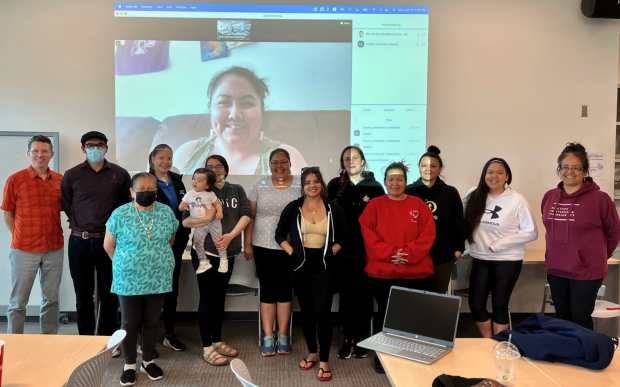 Indigenous Education Student Candidate Training in the DSC: A cohort of Indigenous Education – Language Revitalization teacher candidates participated in an intensive two-and-a-half weeks of hands-on training for educational technology and pedagogy in the DSC in June (IED 336). The class was led by Rich McCue and was fortunate to have Ry Moran as a guest speaker to share his podcasting experience and expertise that he has developed over the years. Other guest speakers included SX̱EDŦELISIYE (Renee J. Sampson), from the WSÁNEĆ First Nation, Joanna Lake from School District 61, and Jesse Miller from Mediated Reality. The curriculum for the intensive class is all Creative Commons licensed (CC-BY), incorporated 12 DSC workshops into the curriculum and uses an open pedagogical approach: edtechuvic.ca/ied336/
Indigenous Education Student Candidate Training in the DSC: A cohort of Indigenous Education – Language Revitalization teacher candidates participated in an intensive two-and-a-half weeks of hands-on training for educational technology and pedagogy in the DSC in June (IED 336). The class was led by Rich McCue and was fortunate to have Ry Moran as a guest speaker to share his podcasting experience and expertise that he has developed over the years. Other guest speakers included SX̱EDŦELISIYE (Renee J. Sampson), from the WSÁNEĆ First Nation, Joanna Lake from School District 61, and Jesse Miller from Mediated Reality. The curriculum for the intensive class is all Creative Commons licensed (CC-BY), incorporated 12 DSC workshops into the curriculum and uses an open pedagogical approach: edtechuvic.ca/ied336/
“I am partial to the Digital Scholarship Commons (DSC). The workshops are helpful to faculty and students alike. There is also a wonderful view! I often encourage students to take workshops with the terrific library staff at the DSC.” – Dr. Sara Humphreys, English Department
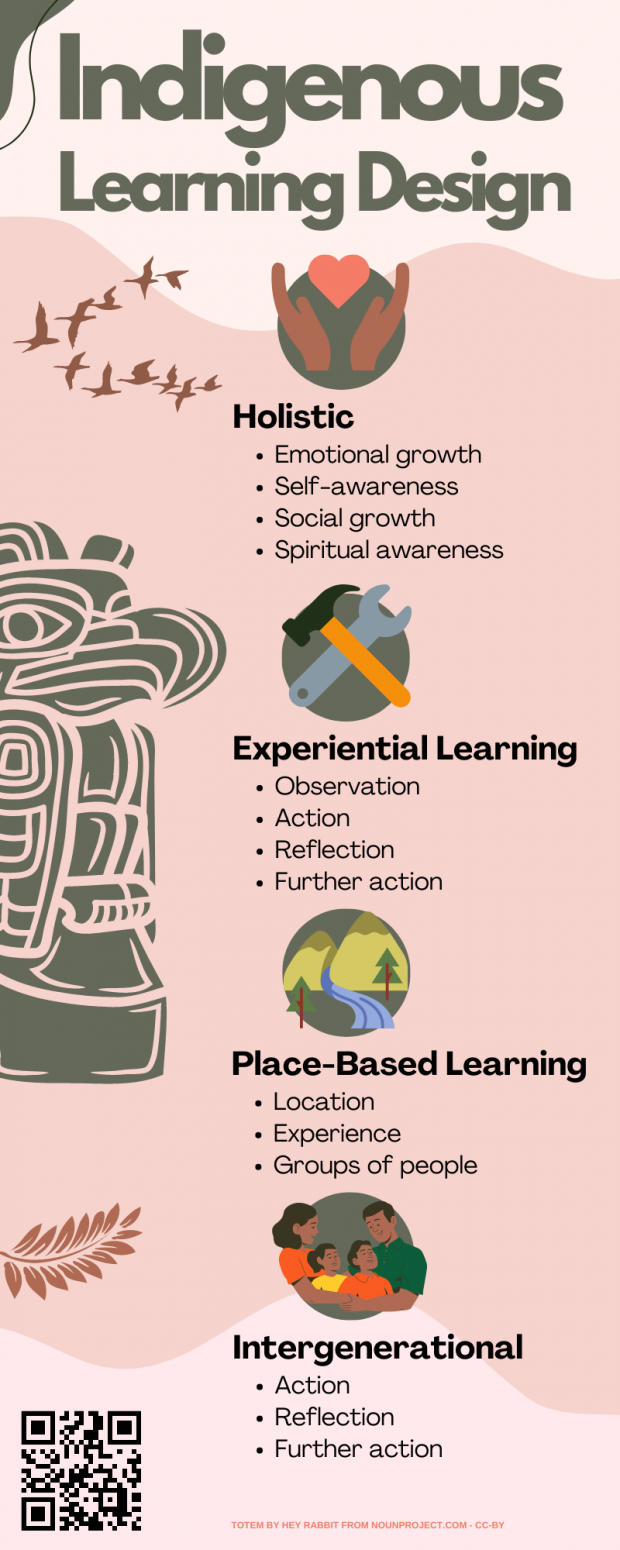 Indigenizing DSC Workshop Curriculum:
Indigenizing DSC Workshop Curriculum:
The DSC is continuing the process of Indigenizing its information fluency workshops. This ongoing process so far has included incorporating more holistic, experiential learning, and place-based learning into a handful of workshops.
To begin with, we have created a handful of new workshop activities which incorporate positive Indigenous themes and subjects so that Indigenous learners can see themselves in the curriculum. For example, the new Indigenous Learning Design infographic activity and the SENĆOŦEN language-themed sketchnote activity for language learning are two examples of new activities.
Feedback from a School District 61 Teacher-Librarian after a presentation on Hyflex instruction for library workshops at the 2022 VILSC conference:
“I can’t tell you how much I appreciate the DSC’s leadership and support with Hyflex pedagogy and equipment. It has been a real game-changer and it will only get bigger and better. The staff and the Parent Advisory Committee have fully embraced the idea of Hyflex learning opportunities and are fully behind the pedagogy. I approached the Parent Advisory Committee and asked for $600 to get a camera and wireless microphone. Their response was to set aside $5000 and to encourage me to get multiple set-ups in the school. They are overjoyed with how this technology can benefit students who are unable to come into the building for various reasons. This never happens in K-12!” – School District 61 Teacher-Librarian
Digital Badges & Informal Credentialing
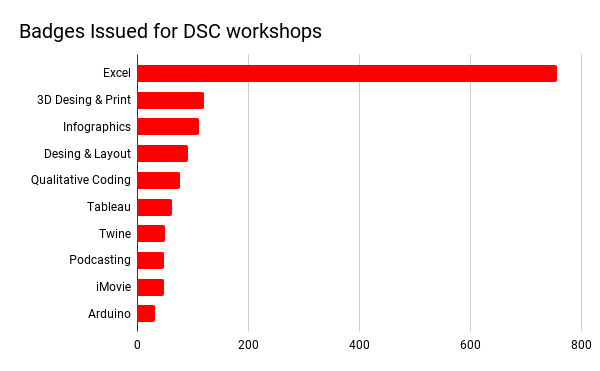 The DSC informal credentialing pilot project continued in 2022; a total of 487 badges were issued for the successful completion of digital fluency workshops over the course of the year. Students had to explicitly opt-in to receive a badge, at which point the workshop instructor reviewed the work to make sure it met the requirements for earning a badge. By far our most popular badge is for our Data Analysis with Excel workshop, as it seems to be a skill in high demand by many co-op employers.
The DSC informal credentialing pilot project continued in 2022; a total of 487 badges were issued for the successful completion of digital fluency workshops over the course of the year. Students had to explicitly opt-in to receive a badge, at which point the workshop instructor reviewed the work to make sure it met the requirements for earning a badge. By far our most popular badge is for our Data Analysis with Excel workshop, as it seems to be a skill in high demand by many co-op employers.
“Some of the most interesting experiences I’ve had in a library are attending workshops in the Digital Scholarship Commons. I appreciate that this space has been set up to organically evolve with the needs of users – a great model for UVic services.” – Dr. Tom Gleeson, Faculty of Engineering
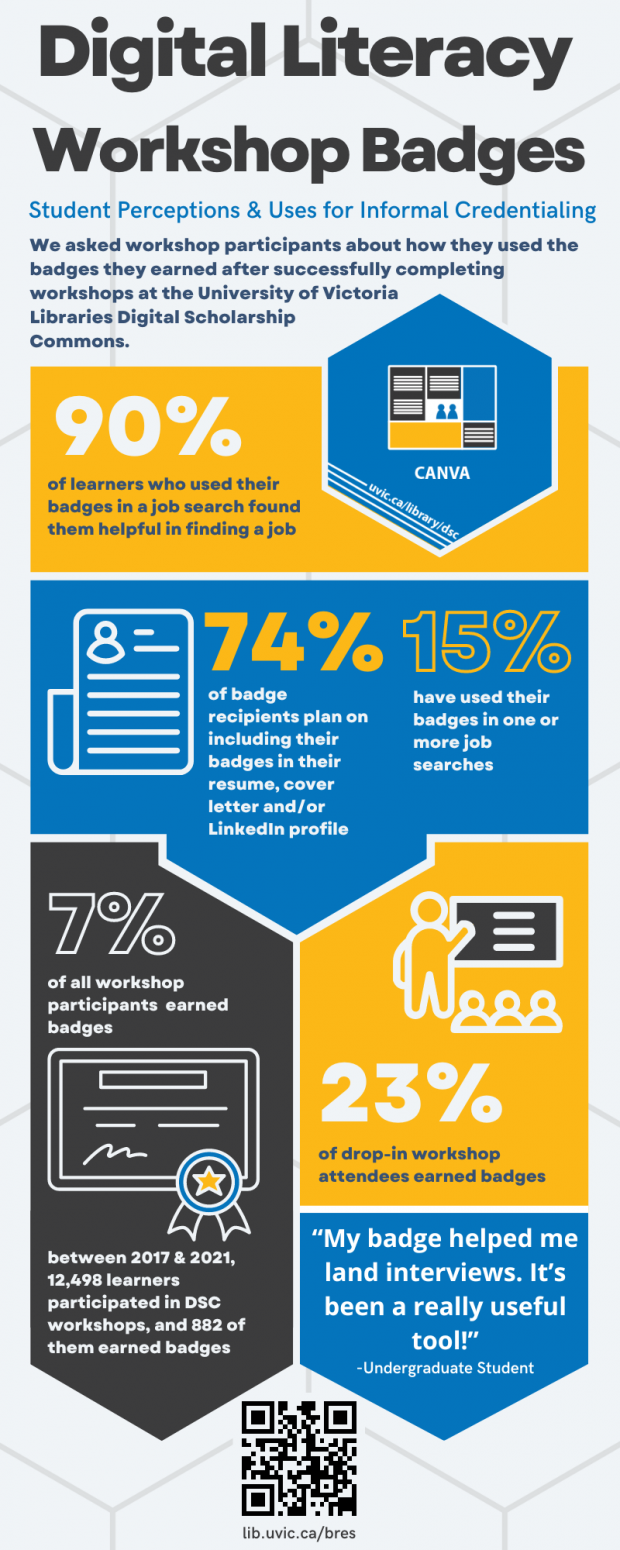 The “3D Design & Print,” “Infographics” and “Design and Layout with Canva” workshop badges are the three next most popular informal credentials the DSC offers. These badges communicate to employers extracurricular skills in which learners have demonstrated training and competency.
The “3D Design & Print,” “Infographics” and “Design and Layout with Canva” workshop badges are the three next most popular informal credentials the DSC offers. These badges communicate to employers extracurricular skills in which learners have demonstrated training and competency.
As part of a UVic Human Ethics Research Board approved project, the DSC gathered mixed-methods data to evaluate the perceived value of badges by students who received them. Of particular interest is how students perceived the DSC badges as being valuable in helping them obtain co-op or post-graduation employment. For more information about this study, and to see the qualitative and qualitative results, here is a link to the paper: Makerspace Workshop Badges: Student Perceptions & Uses of Informal Credentialing (McCue & Johnson, 2022).
“Thank you so much for a wonderful Infographics workshop today. It was very informative and I have had students let me know how useful it was. Thanks again and I will definitely be looking for more workshops to incorporate into my courses!” – Dr. Renée Monchalin, School of Public Health & Social Policy
Graduate Student Experts & Young Canada Works Interns
In September we welcomed Victoria Hartman as our DSC Intern. Victoria is a recent UVic Biomedical Engineering graduate and has experience with BioPrinting (using Biomedical Engineering’s specialized Bio 3D printers); as well as 3D design and printing, microcontrollers, and scientific research tools. Victoria’s diverse skill set and willingness to learn new tools and teaching techniques made her an excellent fit for the DSC. She managed 3D print jobs, assisted in indigenizing our curriculum, and taught DSC workshops from September 2022 to the end of March 2023.
“Thank you so much for coming to work with my students last week. The HTML/CSS workshop was really fun and we all enjoyed learning from you and being able to call on your expertise.” – English Department Professor
Farewells
In March, we bid farewell to Nathaniel Loman who was our Young Canada Works (YCW) intern. Nathaniel graduated from the Math and Computer Science department at UVic and did an excellent job migrating many of our workshops from Google Docs to GitHub while also keeping up with the constant flow of new 3D-print jobs. Nathaniel is now working at Codename Entertainment in Victoria, BC
In April, both of our wonderful Graduate Data Analysis experts–Alex Gavrilov and Viet Dao–successfully defended their theses and graduated. While they worked in the DSC, they were in constant demand for workshops and consultations, and they taught many workshops on RStudio, Tableau, Excel, and LaTex. Our new Graduate Data Analysis expert has some large shoes to fill. Alex is now working at the Coast Health Authority as a Healthcare Analyst.
In November our YCW Summer Assistant Oscar Morrison finished his time with us after doing significant work testing our new Laser Cutter and updating our 3D Print web application to handle Laser Cutting jobs. We wish Oscar all the best in his new job!
“Working with Nathaniel and the Digital Scholarship Commons was a fabulous experience. The props team at the Phoenix Theatre had the unique challenge of building a breakaway prop for our Fall 2021 production of “Dead Man’s Cellphone” by Sarah Ruhl. With Nathaniel’s help, we were able to print the necessary parts of a 90s-era cellphone and construct an effective prop that broke reliably for each performance. Many thanks!” – Carolyn, Fine Arts Graduate Student
New & Upgraded Workshops for 2022
- Data Frames in Pandas: This new workshop was created by Cairo Sanders and introduces learners to Pandas DataFrames which are two-dimensional data structures that are used to store and manipulate tabular data. They are similar to tables in a relational database or spreadsheets in Excel. DataFrames are useful for data cleaning, data analysis, and data visualization. They can be used to perform operations such as filtering, sorting, grouping, merging, and joining data. Pandas is a popular Python library for working with DataFrames.
- Sketchnote Your Way to Better Grades: We created a new sketchnoting activity to assist learning to create a sketchnote based on a chapter from the book, Pulling Together – A Guide for Indigenization of Post-Secondary Institutions. This activity not only helps learners develop their sktechnoting skills but also introduces them to some indigenous learning concepts.
- Data Analysis with Excel: We’ve split our most popular workshop, Data Analysis with Excel, into two parts: an introductory workshop and an intermediate workshop. This makes it easier for learners to complete the curriculum. Before the split, most participants weren’t able to finish all the activities during a single 90-minute workshop. Learners had the opportunity to complete all the activities on their own, but not having the support of the instructor for the more advanced activities wasn’t ideal. The two new 90-minute workshops should better meet the needs of workshop participants. Learners who don’t need more advanced skills can earn an Introduction to Excel badge, while more advanced learners can earn an Intermediate Excel badge in addition to the Intro Badge.
- Design for Laser Cutting: With the arrival of the library laser cutter, we developed an introductory workshop to help interested members of the UVic community acquire the skills they need to make simple laser cutter projects. Laser cutting is a fast and accurate way to engrave objects, make boxes, and more! Laser cutters use computer-controlled high-powered lasers to engrave or cut wood, metal, paper and more with high precision.
- Survey creation in SurveyMonkey: Sharon Dias, our Qualitative Data Analysis Graduate Assistant, developed a workshop based on SurveyMonkey to help people get up to speed quickly with surveys using a UVic-approved tool. SurveyMonkey is an online survey creation tool that allows users to create powerful surveys, quickly deliver online surveys to participants, and rapidly visualize the survey results.
- Infographics with Canva: We created a new infographic activity to assist in learning to create an infographic about indigenous ways of learning. This activity not only helps learners develop their infographics skills but also introduces them to some indigenous learning concepts.
More Feedback
“Hello Dani, I just want you to know that the 3D printed license plate mount is beyond amazing!!! Very very rigid, and looks beautiful!! Thank you for helping me with all the different settings! You’re the best!” – Student who requested assistance with their 3D printing project
“The Digital Scholarships Commons is an exciting venue where my students and I have been exposed to cutting-edge digital tools.” – Dr. John Lutz, History Department
“My favourite places in the library are the Digital Scholarship Commons and the Electronic Textual Cultures Lab. These spaces afford free access to up-to-date equipment and software, together with a community of scholars actively working on projects that expand knowledge access through digital media.” – Dr. Ann Stahl, Archeology Department
[/et_pb_text][et_pb_post_nav _builder_version=”4.27.2″ _module_preset=”default” hover_enabled=”0″ global_colors_info=”{}” sticky_enabled=”0″][/et_pb_post_nav][/et_pb_column][/et_pb_row][/et_pb_section]


